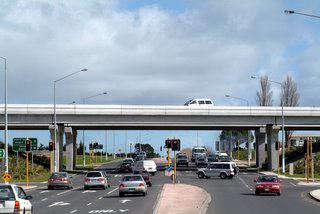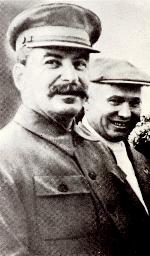
.
Today
Transit will release its draft 10 year State Highway plan for 2006/07-2015/16 – and the
media will make it an enormous deal, the one-time ACT supporting
Kim Ruscoe already has (I know this because I overheard her saying so a few years ago), even though it really isn’t meant to be.
.
The plan is a forecast, based only on the revenues and anticipated allocations of Land Transport New Zealand over the next ten years. It does not mean any project will or will not proceed – at all. Funding is NOT decided by Transit New Zealand, it is decided by
Land Transport New Zealand (formerly Transfund), which most reporters in New Zealand can't grasp, even though every frigging year the process is the same, and has been since 1996 when it was changed by National!
.
The process goes like this:
.
- Transit every year prepares a draft State Highway Programme, a bidding document which outlines the projects and outputs it will seek funding for from Land Transport NZ in the following financial year. This is based on the priorities for the current year and indications of available funding provided by Land Transport NZ based on the latest forecasts of revenue from fuel tax, road user charges, motor vehicle registration/licensing fees and Crown account allocations. The draft is for consultation with the public and local authorities, largely on the priorities Transit has set and also because local authorities produce their own bidding documents for funding their local road networks (and for subsidising public transport).
.
- The draft Programme consists of detail of the projects and outputs for the following financial year as the focus. However, to give context and to encourage Transit to plan and prepare for the ongoing maintenance and development of its network, it also prepares a plan for the following nine years as a forecast, to indicate what might be done under current policy and revenue settings.
.
- Following consultation, Transit’s board takes this into account and agrees on a final State Highway Programme which is submitted to the board of Land Transport New Zealand. Land Transport NZ, along with the programmes of 86 local authorities, considers the latest revenue forecasts (this is May by now) and prioritises the expenditure across all those entities, and releases the National Land Transport Programme for 2006/2007. That programme determines the allocations by activity class (e.g. State Highway Construction) and the amounts for maintenance, public transport subsidies and bulk funding for projects (and the list of approved projects) that are worth less than $3.5 million each.
.
- Transit simultaneously releases the final agreed State Highway Programme for 2006/2007, which INCLUDES a forecast for following years.
.
- However, final approval for funding for any single project over $3.5 million still requires signoff by the Land Transport NZ Board following evaluation of the costs and benefits of the project.
.
So what does this mean? Once it is released, it is a draft and when it is finalised it is still only an indicative programme.
.
Ruscoe's interviewing her typewriter with claims like "The worst-hit site in the Wellington region is believed to be the planned Paekakariki interchange, a flyover to move traffic safely on and off State Highway 1. It was set down in a proposed western corridor plan for 2007, but Transit's forecast stated that the earliest start date would be 2015, a source said."
.
Well Kim, read the CURRENT year's final plan and there was no year for the Paekakariki Interchange. The proposed western corridor plan is a consultation plan, and has not been approved, and was prepared based on forecasts that are now over 6 months old.
.
Yes, there is probably a funding gap, although Transit theoretically should not develop a programme which is unfundable – that is the whole point of this sort of forward planning. The big issue is whether the amount of road construction underway now, which is at levels unprecedented for over 30 years, is entirely efficient. In many cases it is, but you have to ask yourself questions about why the new motorway north of Orewa is in a tunnel now, instead of the original design for a cutting, in order to reduce environmental impact - for a good $35 million?
.
There are two big issues:
- Inflation of project costs (caused by increases in oil prices, increased construction margins because of the huge rampup in road spending in the last two years and greenplating/goldplating by Transit engineers blaming the Land Transport Management Act for requiring high standards of environmental and social mitigation);
- Decreasing petrol tax revenue (caused by reducing traffic growth and increasing efficiency of the petrol vehicle fleet - this doesn't effect road user charges revenue of course).
.
The appropriate answer is for Transit to become a company and to run at a profit, and to shift funding from being bureaucratic to being Transit charging customers directly - like National once proposed. Then it could borrow to build roads, paid back from road user charging.
.
You see, Telecom, Contact Energy and Air New Zealand don't decide the amount of money they spend on capital every year based on annual surplus cash flow, and just spend that - they borrow, to spread the cost of the new asset across its depreciated life. Road users, on the other hand, pay taxes now, which are spend to build roads, that future road users use (albeit most of them are current ones, but since the depreciated life of a highway cutting is over 50 years) and don't pay anything towards the capital of. The Auckland motorway network was paid for by past generations, and only maintained by current ones - but phone lines, power lines and aircraft are not funded that way. If they were, you'd get congested lines, old planes as Air NZ saves up for new ones and slow progress. Imagine if you could never borrow for a home, you'd have to save up for decades until you could buy it - cash - while chasing the price of property.
.
- then Transit would be engaging in cost control, but also delivering what its customers wanted and charging them appropriately for it. In the absence of that, the funding system should be revamped to have a tighter focus on economic efficiency and to ensure that projects don't proceed if they have benefit/cost ratios that are very low - and there needs to be a bigger shift to user pays, which means, for now, moving more petrol tax revenue into roads - and looking more to direct user pays to replace petrol tax.
.
By the way, if the SH20 Avondale extension was not built, all the other roads could be easily funded, because it is estimated to cost around $1.2 billion, which over five years sucks out $240 million a year - but if you borrow over 35 years, it would spread it out, even taking into account the cost of borrowing.


